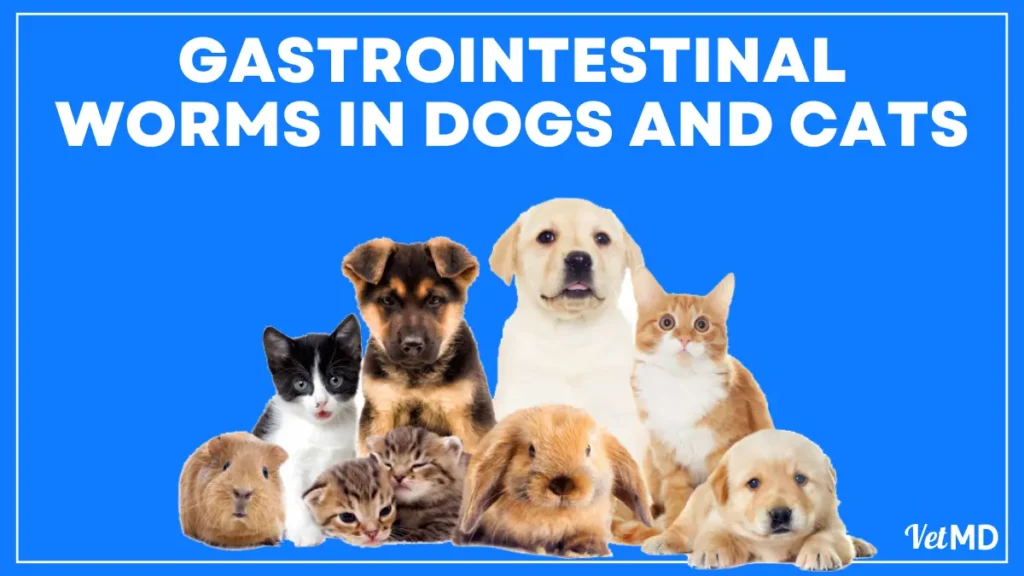Roundworms, threadworms, tapeworms, hookworms and several species of Protozoa like giardia and coccidia are commonly found in the gastrointestinal tract of the domesticated dog and cats. On heavy infestation, these may appear in the faecal matter and are sometimes visible to naked eye.
Clinical Symptoms of Gastrointestinal Worms
- Increased appetite in the beginning.
- Occasional nausea and vomiting with tendency of eating grass and garbage.
- Mange or eczema like skin eruptions over the body with constant itching.
- Gradual decline in health and vigour of animal.
- Sometimes appearance of adult roundworms, threadworms or segments of the tapeworms in faeces.
- In threadworms and tapeworms infestation, the dog may be seen rubbing his buttocks and the anus over the grassy ground.
- There is diarrhoea with black faeces or redness around the anus and under the root of the tail.
- The dog or cat may be seen scratching his back portion by mouth.
- In tapeworm infestations, cucumber seed like segments of tapeworms can pass out in stool of the pet. They resemble like dried rice grains.
- Microscopical examination of the stool can reveal the presence of eggs or ova of such worms.
- The worm ingested dogs or cats may show symptoms of anaemia and nose bleeding.
- Occasionally, convulsions and fits also occur in severe infestation.
- The Protozoa infection may cause very severe and foul smelly diarrhoea.
Treatment of Gastrointestinal Worms
Prazisam, Prazipaste and Praziplus, Drontal Plus, Cestonil and Kilverm tablets are the drug of choice as broad spectrum anthelmintics effective against wide species of helminths in pets especially in mixed infection of worms in conditions where accurate diagnosis is not possible. The dose of this deworming medicine is 1 tablet per 10 kg body weight.
For prevention, single dose is sufficient but for cure, it may be repeated after 21 days. These drugs provide complete elimination and control for all types of roundworms, tapeworms and hookworms commonly seen in dogs and cats. They are also effective against larval and adult stages of these parasites. These are quite safe and can be given as a routine therapy for the control of gastrointestinal worms in pets.
The protozoa infection should be treated by Flagyl or Metrogyl group of medicines. ‘No amoeba’ and ‘Secnil Forte’ are the latest drugs of choice and single dose treatment is sufficient to control the protozoan infection.
For Lungworms
Levamisole oral tablet @ 7.5 mg/kg body weight for dogs and 10 mg/kg for cats. The drug is fairly toxic especially in cat and injectable formulation should never be used.
Stick to regular deworming. Two doses at an interval of 15-20 days are usually sufficient to get rid of worm infestation. For small dogs and pups the drug be diluted with distilled water.
Preventive Deworming Schedule for Dogs and Cats
| From 6-24 weeks of age | From 6-12 Months of Age | After One Year of Age | |
| Against Roundworms | Once a month regularly | Once in 2 Months | Once in 4-6 Months regularly |
| Against Hookworms | Twice a Year | 2 Doses at 15 Days Interval | 2 Doses at 15 Days Interval |
| Against Tapeworms | Single Dose Treatment | Single Dose Treatment | As and when required |
The latest drug available in the market is ‘Ivermectin Injection’ for the treatment and control of internal and external parasites. The dose is 1ml per 50 kg body weight by subcutaneous route. Three injections at an interval of 7-14 days are sufficient. The brands available for this group are Alverin, Endact and Mectin – 1 ml ampoule for use in pets.
Pets should not be dewormed indiscriminately without an accurate diagnosis. Some anthelmintics may harmful to debilitated animals. No one medication is effective in treating all types of parasites. As a thumb rule, all the pets should have their stool checked at least once a year and proper drug must be used for the presence of parasites reported in the stool examination.
In order to check reinfection, control the pets from eating their own or others stool. The stool are richest source of eggs of different parasites. In multipet household have all the pets tested and dewormed at the same time to prevent the cross infection among themselves.
Since the parasites may develop resistance against a particular drug used repeatedly, it is better to administer different drugs of the same group by rotation for deworming the pets.
Wormin 1 tablet twice a day for three days or Albendazole suspension 5 ml once a day for three days can also be used for deworming of pets. For pups, the dose should be adjusted according to their body weight.
Homeopathic Remedies for Deworming
- Cina30, Santonin 30 for Roundworms
- China 30 for Tapeworms
- Chenopodium Q for Hookworms
- Teucriumm V 30 for Pinworms







Pingback: Pumpkin for Dogs: Can My Dog Eat Pumpkin? Essential Tips
Pingback: Why Do Dogs Eat Poop? Understanding Coprophagia in Dogs